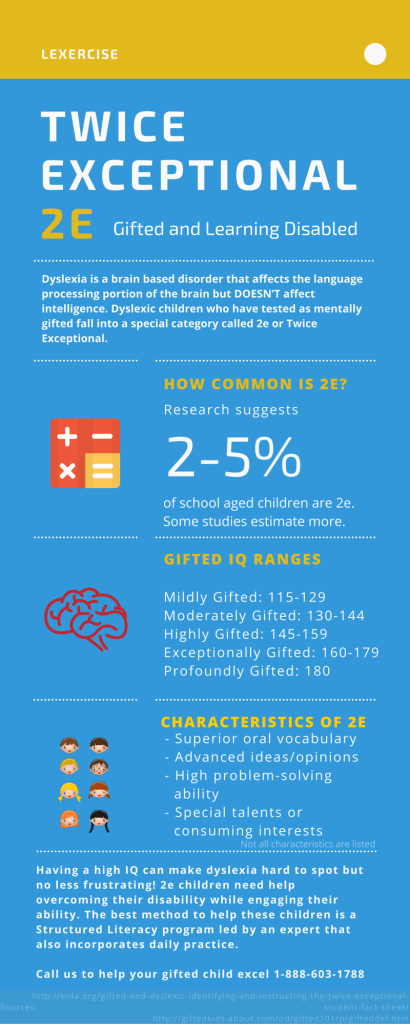Learn About 2e Twice-Exceptional Kids and Dyslexia
Written by Sandie Barrie Blackley, Speech-Language Pathologist
Published on March 31, 2025
Gifted children who also have a disability, such as dyslexia, ADHD, or autism spectrum disorder are known as twice exceptional kids or 2e children.
In the United States, the term exceptional child is used by education professionals to define a student who is eligible for tax-supported programs in accordance with the Individuals with Disabilities Education Act (IDEA) as implemented by their state’s Board of Education and Local Education Agency (LEA). The term includes students who are gifted, as well as students with disabilities.
Identifying a student for exceptional children’s services under IDEA is the responsibility of the student’s public school assessment team, based largely on standardized testing. However, there is no universal method for deciding who qualifies. The wide racial/ethnic and socioeconomic disparities suggest that systems for identifying twice exceptional kids do not work very well.
 Can my Child be Gifted and Dyslexic?
Can my Child be Gifted and Dyslexic?
Students who qualify as gifted typically score in the top 2 percentiles of the population, equating to an IQ of 130 or more. But especially with 2e students, identification of exceptionality can be complicated because one exceptionality can mask the other. For example, a student who is gifted and dyslexic may be able to use their strong listening comprehension and vocabulary skills to compensate for their weak decoding skills, making their reading struggles difficult to observe. Likewise, a gifted student with dyslexia may not be able to demonstrate some of their abilities using timed, standardized tests due to working memory and/or verbal fluency challenges.
It is common for 2e students to have inconsistent academic performance. They are often misunderstood and/or misdiagnosed, leading to exhaustion, frustration, anxiety, and weakened self-confidence and motivation.
If you’d like to learn more about twice-exceptional students and gifted kids with dyslexic characteristics we have compiled a list of references below. If you are looking for help with your gifted and dyslexic child, contact us for a free consultation with one of our expert therapists.
Additional References for 2e Twice Exceptional Kids
- Arabacı, D., & Baki, A. (2023). An analysis of the gifted and non-gifted students’ creativity within the context of problem-posing activity. Journal of Pedagogical Research, 7(1), 25-52.
- Broby, L.E. and Mills, C.J. Gifted Students with Learning Disabilities: A Review of the Issues, Retrieved from LD Online February 13, 2023.
- Hulsey, D. B., Moten, T. R., Hebda, M. R., Sulak, T. N., & Bagby, J. H. (2023). Using Behavioral Engagement Measures of Multiple Learning Profiles to Recognize Twice-Exceptional Students. Gifted Child Today, 46(1), 13–24.
- Mollenkopf, D. L., Matyo-Cepero, J., Lewis, J. D., Irwin, B. A., & Joy, J. (2021). Testing, Identifying and Serving Gifted Children With and Without Disabilities: A Multi-State Parental Perspective. Gifted Child Today, 44(2), 83–92.
Improve Your Child’s Reading
Learn more about Lexercise today.
Schedule a FREE
15-minute consultation


